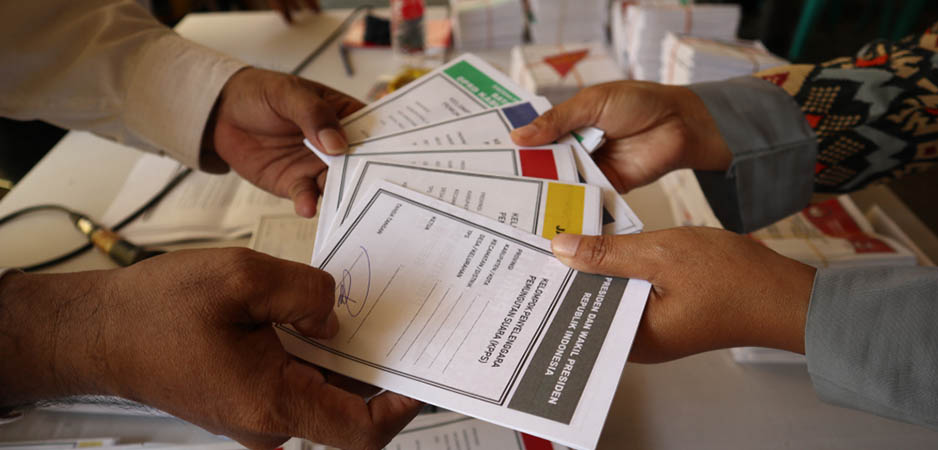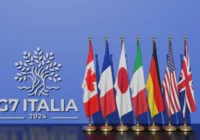The outcome of the election may be unclear, but the next president of Indonesia should take notes on how to do business with China.
On April 17, Indonesians went to the polls to vote for a new president. Although the official result will be announced in May, “quick counts” by polling companies — which have proved correct in in the past — reveal that incumbent President Joko Widodo is set for re-election.
But Widodo — known as Jokowi — is not in the clear just yet. Former army General Prabowo Subianto, who was the main opposition candidate, has claimed there are widespread irregularities in the election. The real results will not be known for a few weeks, and some Indonesians may have to vote again due to fraud allegations.
Yet what is clear is that whoever wins will be faced with political and economic challenges that must be resolved to ensure that Indonesia is moving in the right direction. Of these challenges, one that needs scrutiny is China’s growing influence, particularly the implementation of the Belt and Road Initiative (BRI).
The Belt and Road Initiative in Indonesia
Ever since Chinese President Xi Jinping introduced the BRI in 2013, Indonesia has been one of the countries where the initiative is being actively realized. To date, the Indonesian government has accepted 28 projects worth $91.1 billion under the guise of the Belt and Road Initiative.
These projects include the Sei Mangkei Industrial Zone; the strategic cooperation at Kualanamu International Airport for the second phase; the development of clean energy in the Kayan River, North Kalimantan (Kaltara); the construction of exclusive economic areas in Bitung, South Sulawesi; and Kura-Kura Island in Bali. The projects between China and Indonesia are carried out by private business entities, state-owned enterprises and universities. For example, the Kura-Kura Island project will be conducted between the Bandung Institute of Technology in Indonesia and Tsinghua University in Beijing.
The Belt and Road Initiative is expected to bring many benefits to Indonesia, but it has also brought worry to the average citizen. There are three reasons behind this.
First, at the end of President Susilo Bambang Yudhoyono’s term (2009-14) and the beginning of the Jokowi administration, China offered the BRI projects to Indonesia. However, only $3 billion has been executed from the $50 billion that was prepared.
This means many of the projects have been delayed and their completion plan is not clear. The issue has been discussed by many observers, and some have argued that Indonesia is being destroyed by China. Yet Beijing needs Indonesia as a strategic satellite in Southeast Asia. This is related to the existence of the Trans-Pacific Partnership (TPP), which since March has changed its name to Comprehensive and Progressive Agreement for Trans-Pacific Partnership (CPTPP). Similar to the TPP — minus the United States — the CPTPP aims to reduce China’s appetite to become the axis of the world economy and politics.
Over Jokowi’s last four years in office, the pace of BRI projects by China has been slow. Yet with a possible second term in the making for him, Beijing is likely to be more careful. It will not let money be disbursed if it concludes that a BRI project is at risk with a change of power in Jakarta. So, until the next government is announced, it is likely that many of these projects will continue to be delayed.
Second, another worry in Indonesia is related to foreign workers. In recent years, there has been growing paranoia against foreign workers, particularly those of Chinese origin. In fact, during the last presidential debate for the election, Sandiaga Uno, a candidate for the vice presidency, raised the issue of foreign workers in Indonesia as potential threats to citizens.
It is important to note that bringing workers from China is common for Chinese overseas investments, especially in places like the Gulf and Africa. For Beijing, while there is an ongoing effort for skill transfer to locals, bringing its own laborers creates efficiency in the work, especially when it comes to language and working styles. This has led to worry in Indonesia that the entry of Chinese workers, with the implementation of the BRI, would threaten Indonesian jobs.
 Third, the existence of the Belt and Road Initiative has also led to fear of a debt trap. This has been an issue in various countries where the initiative is being implemented, especially after the cases of Hambantota Harbor and Mattala Rajapaksa International Airport, which are BRI projects in Sri Lanka. The projects have made Sri Lanka fall into debt to China, with up to $8 billion owed. That number is equivalent to 10% percent of total government debt. The problem is that Sri Lanka is facing difficulty repaying the loan because the return on investment of the newly-inaugurated projects is not as large as originally estimated.
Third, the existence of the Belt and Road Initiative has also led to fear of a debt trap. This has been an issue in various countries where the initiative is being implemented, especially after the cases of Hambantota Harbor and Mattala Rajapaksa International Airport, which are BRI projects in Sri Lanka. The projects have made Sri Lanka fall into debt to China, with up to $8 billion owed. That number is equivalent to 10% percent of total government debt. The problem is that Sri Lanka is facing difficulty repaying the loan because the return on investment of the newly-inaugurated projects is not as large as originally estimated.
Xiaomeng Lu, a global public policy consultant at Access Partnership, said China had political and military ambitions to fill the vacuum of influence in the maritime regions. The situation has triggered allegations, including in Indonesia, that Beijing is trying to push strategically-located countries, including Djibouti and the Maldives, into debt traps that are then used to master the control of key infrastructure.
The new government needs to renegotiate
It is important for the new government of Indonesia to learn from the experiences of countries in Asia, including Pakistan, Sri Lanka, Bangladesh, the Maldives, Kyrgyzstan, Tajikistan and Laos. These countries receive investment from China and end up in debt. In doing so, they must then be willing to give up some of their territorial assets due to defaulting on loans as a result of high interest rates.
A case in point comes from Malaysia, which has tried to renegotiate the BRI projects with China. After being faced with an option to either renegotiate or pay termination costs of about $5.3 billion, Prime Minister Mahathir Mohamad decided to bring China back to the table. Under the new agreement, the project cost has been reduced. Malaysia will still need to take a loan from a Chinese state-owned bank to fund the initiative, but it will be less than under the original deal. This shows that negotiation is important with Beijing.
In regards to foreign workers, Indonesia could also learn from other countries in facing Chinese investments. Some states in the Arabian Peninsula, for example, require foreign companies to partner with national firms to open businesses. Those companies are also required to hire locals for directive and managerial positions, as well as to train local workers to be employed.
The incoming administration would do well to remember that Indonesia has considerable bargaining power with China. While Indonesia may need Chinese investments to improve its economy, China needs Indonesia to reach its economic goals overseas. If we look at the official map of the BRI, the planned maritime route from China to Rotterdam would not be possible without the role of Jakarta. The next president — whoever that is — should take note.
The views expressed in this article are the author’s own and do not necessarily reflect Fair Observer’s editorial policy.
Support Fair Observer
We rely on your support for our independence, diversity and quality.
For more than 10 years, Fair Observer has been free, fair and independent. No billionaire owns us, no advertisers control us. We are a reader-supported nonprofit. Unlike many other publications, we keep our content free for readers regardless of where they live or whether they can afford to pay. We have no paywalls and no ads.
In the post-truth era of fake news, echo chambers and filter bubbles, we publish a plurality of perspectives from around the world. Anyone can publish with us, but everyone goes through a rigorous editorial process. So, you get fact-checked, well-reasoned content instead of noise.
We publish 2,500+ voices from 90+ countries. We also conduct education and training programs
on subjects ranging from digital media and journalism to writing and critical thinking. This
doesn’t come cheap. Servers, editors, trainers and web developers cost
money.
Please consider supporting us on a regular basis as a recurring donor or a
sustaining member.
Will you support FO’s journalism?
We rely on your support for our independence, diversity and quality.






